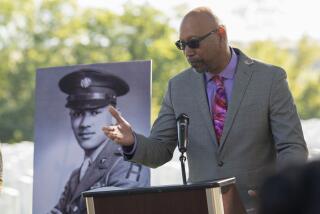Britain Honors 52 for Secret Gulf Duty
- Share via
LONDON — An indication of the extent of the secret military operations behind Iraqi lines during the Persian Gulf War came to light Saturday with the publication of a list of awards for gallantry for the British forces.
Members of the army’s Special Air Service (SAS) and the Special Boat Squadron (SBS) of the Royal Marines received 52 decorations--more in relation to their numbers than at any other time in the history of the secret units.
The number and quality of the awards reflects the extent of the secret operations carried out before and after the outbreak of air and ground fighting, military sources say.
Of the 45,000 British servicemen and women in the Gulf, 632 received awards for gallantry and meritorious service.
Normally, the work of the SAS, whose soldiers sometimes operate in civilian attire, remains secret, as during the Falklands War with Argentina in 1982. This was the first time their awards have been publicly announced, though only one of the SAS troopers was identified by name.
But Prime Minister John Major, Gulf ground commander Gen. Peter de la Billiere and Air Chief Marshal Patrick Hine, overall director of the campaign, have alluded to the feats of the SAS.
Hine reported Saturday that the SAS regiment’s work was the “largest and most significant United Kingdom special forces operation since 1945.” He added that their importance “cannot be overestimated.”
The SAS, assisted by American Special Forces troops, and the SBS, working with U.S. Navy SEALS, were entrusted with a variety of behind-the-lines operations, going in by parachute and helicopter, military sources say.
They scouted western Iraq to locate mobile Scud missile launchers and relayed the coordinates to air force bombers; they inserted laser devices to aid allied “smart” bombs homing in on key targets.
They also picked up Iraqi prisoners for questioning, and some of their Arabic-speaking members reportedly infiltrated Kuwait city and areas in southern Iraq gathering intelligence.
The SBS and Navy SEALS played an important role in setting off explosives along the Kuwaiti shoreline, sources say, thus diverting the attention of the Iraqi Republican Guard toward the coast, where they expected a U.S. Marines invasion, while the main thrust of the allied offensive was overland, well to the west.
Only one SAS medal-winner was named: Cpl. David Denby, who was killed defending other soldiers far behind enemy lines. His actual citation remains secret. Three other SAS troopers died in action.
The SAS maintains a great secrecy on the activities of the regiment, based in Hereford in western England, so that members will not be subject to personal attack because of their sensitive undercover work in Northern Ireland and other areas of operation.
More to Read
Sign up for Essential California
The most important California stories and recommendations in your inbox every morning.
You may occasionally receive promotional content from the Los Angeles Times.









